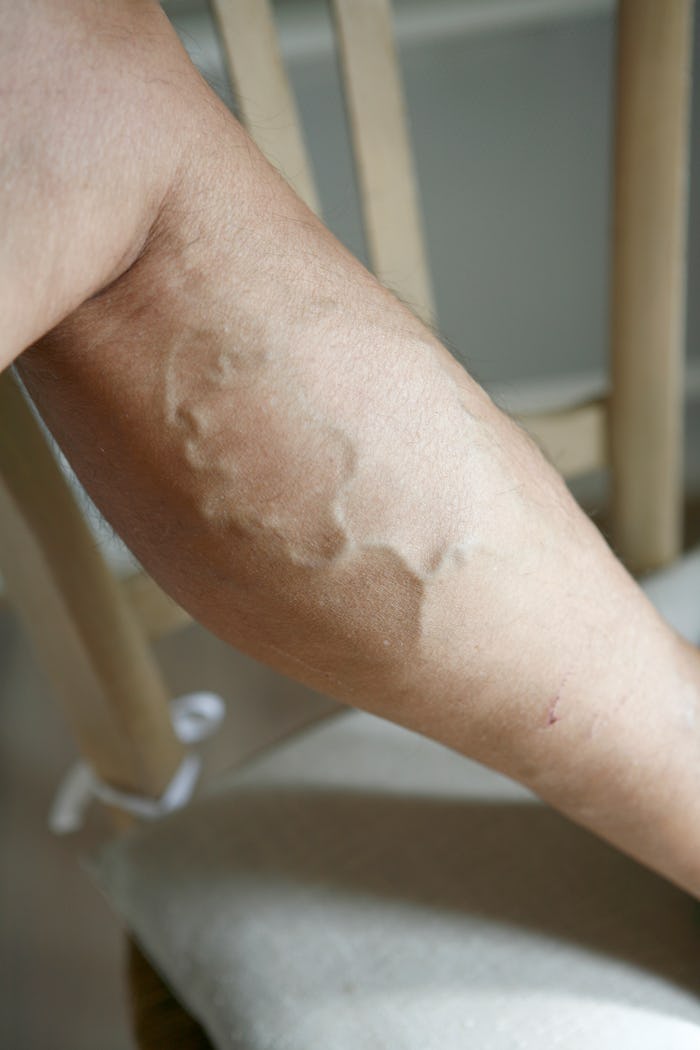Health

Here's How To Prevent Varicose Veins During Pregnancy, According To A Doctor
Two words: Compression socks.
Varicose veins are something many women fear. The result of faulty valves, they happen when blood starts to flow the wrong way. This can cause visibly swollen or enlarged veins that often ache or feel heavy. And while varicose veins are almost always hereditary, pregnant women are more susceptible to them. But doctors Siddharth Bhende and Sean McWilliams say that with some smart steps, women can learn how to prevent varicose veins during pregnancy.
“The vast majority of the time varicose veins are due to genetic factors,” says Dr. Sean Williams, national medical director of vein clinics of America. Therefore looking at your family history is the first step in gaging your risk factor for varicose veins, he says. If you discover that you are predisposed, meaning a family member — be it your mom, grandpa (yes, they happen in men too), great aunt, etc. — has suffered from varicose veins, you might be more prone to them as well.
From there, a pregnant woman can prepare to combat this potential ailment that tends to be exacerbated by pregnancy. This is because as a baby grows larger, it presses on a mother’s uterus, says Dr. Bhende, a vascular surgeon with Sentara Medical Group with a specialty in varicose veins. “As the baby grows, it compresses the veins in the pelvic region, so it's kind of a pressure phenomenon.”
This is all to say that a mom might experience painful varicose veins during pregnancy, then see them retreat after delivery. But that doesn’t mean the vein disease has vanished. It could flair up again, either in another pregnancy or just as a woman ages.
How to prevent varicose veins during pregnancy is to stay active.
“That means walking, not being a couch potato,” says Dr. Bhende. “Using the leg muscles on a regular basis helps the legs feel better,” says Dr. McWilliams.
Neither doctor is endorsing high intensity workouts, but just regular physical exercise in order to quite literally keep the blood flowing.
Another way of how to prevent varicose veins during pregnancy and that heavy fatigue feeling so often associated with them is to elevate the legs. “That’ll help drain the blood out. Not to sit or stand for a prolonged amount of time,” says Dr. Bhende. That said, he warns that once you put your legs back down, the relief you felt will likely dissipate.
“Then the last thing they can do, which is not really comfortable but can help, is wear compression stockings,” says Dr. Bhend. “Also known as support hose or compression stockings, you can wear those during pregnancy. Of course, it's uncomfortable. They're painful to get on. They're difficult to remove. If you wear them during summertime, you know, it's kind of hot and sweaty, so it's not ideal.” But the socks can provide relief.
Short of those prevention measures, if you believe you have or could develop varicose veins, it’s time to see a phlebologist.
“If a woman is having symptoms or has visible signs of vein disease, I want to see them while they're pregnant,” says Dr. McWilliams. That’s because when a woman is pregnant, the increased blood flow actually allows doctors to get a better view of vein issues while doing ultrasound mapping on the legs. “Then, once she delivers, we’re ready for treatment,” Dr. McWilliams adds.
Varicose vein treatment has come a long way since the days when vein stripping — the removal of superficial saphenous vein — was the only option.
“Today there are a few options,” says Dr. Bhende. “We can do laser ablation. We use a little catheter, which is a laser, and so we do laser ablation of the vein. Another option we call Map, but it's micro ambulatory phlebectomy. That means we’re removing these veins, where we make a 2mm incision and take this crochet hook and elevate the vein out of the patient’s body.”
And don’t worry about your veins not being able to operate after such a procedure. Dr. Bhende and Dr. McWilliams assures patients that the body adjusts beautifully.
“The body will naturally and automatically shunt the blood into the deep venous system,” says Dr. Bhende. “That's the system that you cannot see. That's the system that runs parallel with the artery next to the nerve, next to the bones. The superficial system now moves through there and the body just does that naturally.”
Patients can expect to recover within a few days to a few weeks depending on the procedure and most operations are outpatient, meaning a person can return home without a hospital stay.
As the doctors say, varicose veins are very treatable. If preventative measures fail and a person develops them during pregnancy, relief is possible.
“Your primary care doc really doesn't have the ability to know because you have to check with ultrasound to see if some of those larger veins are abnormal or not,” says Dr. McWilliams. “So you can have all the symptoms in the world and not have anything showing on your leg.” In that case he says, “come on and let us take a peek.”
Experts
Dr. Siddharth Bhende, vascular surgeon with Sentara Medical Group
Dr. Sean McWilliams, vein specialist and National Medical Director of Vein Clinics of America